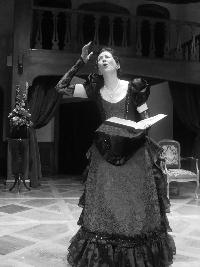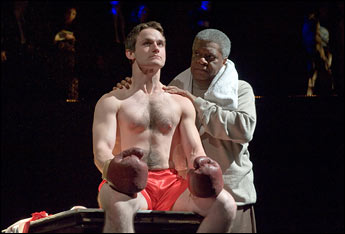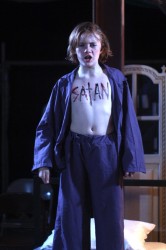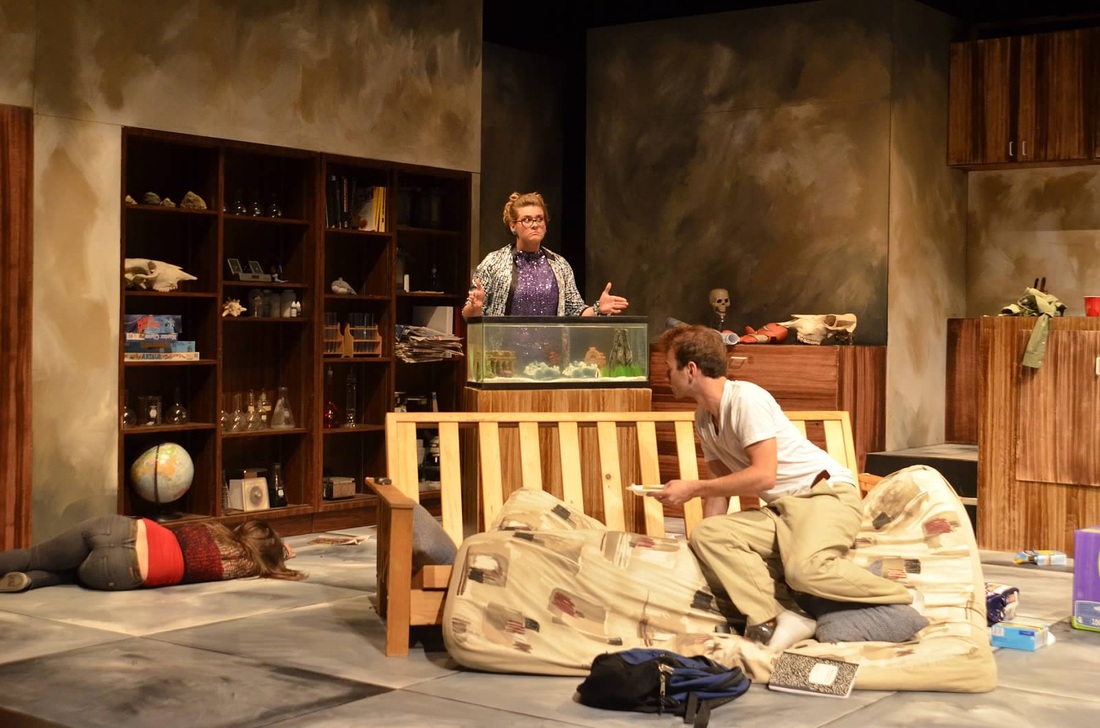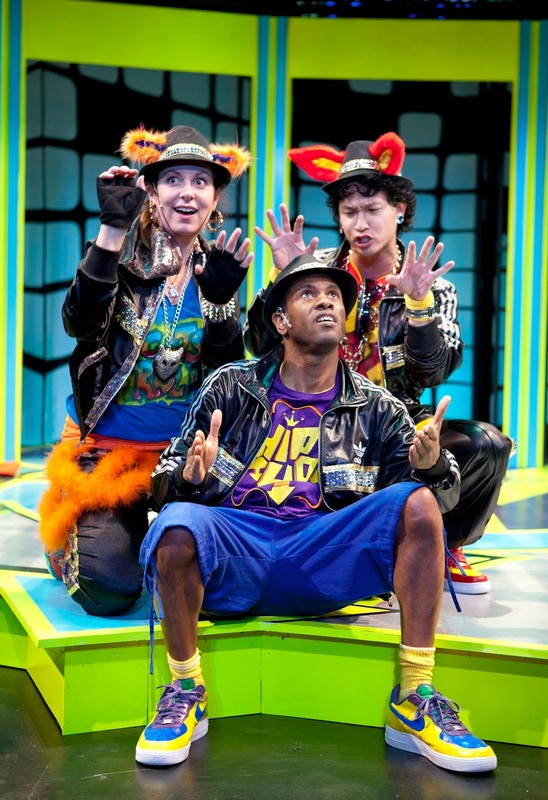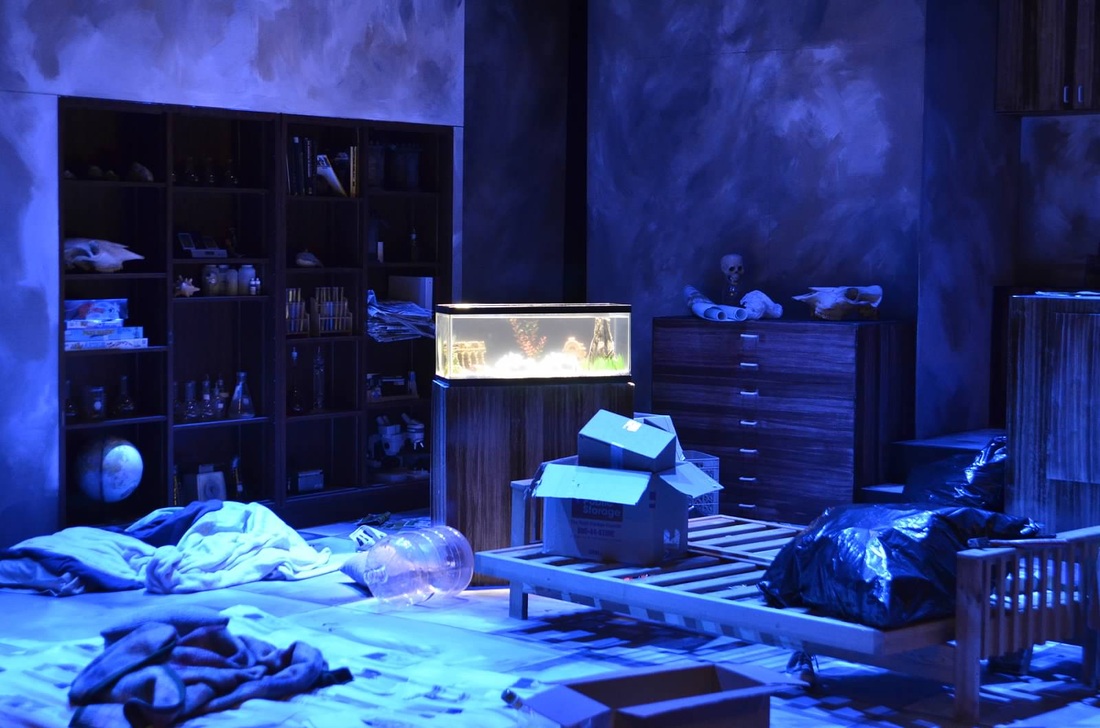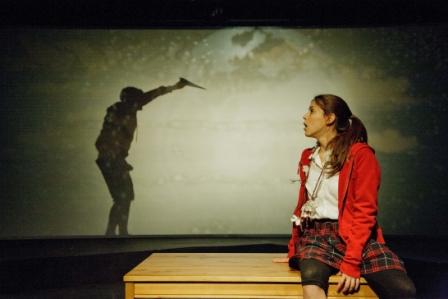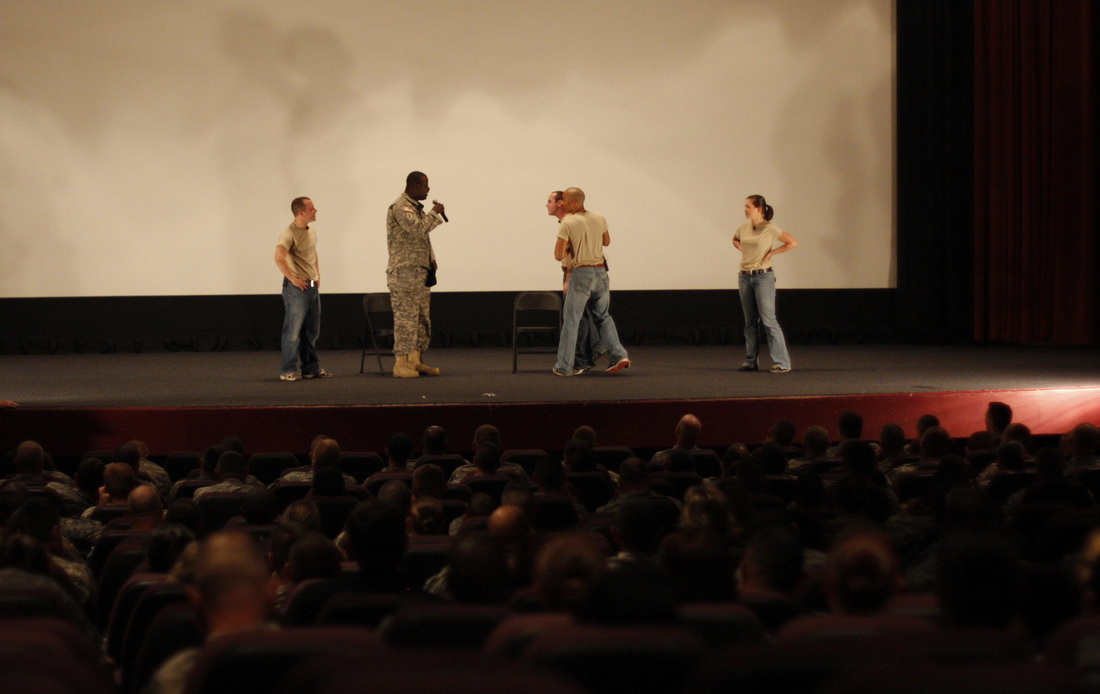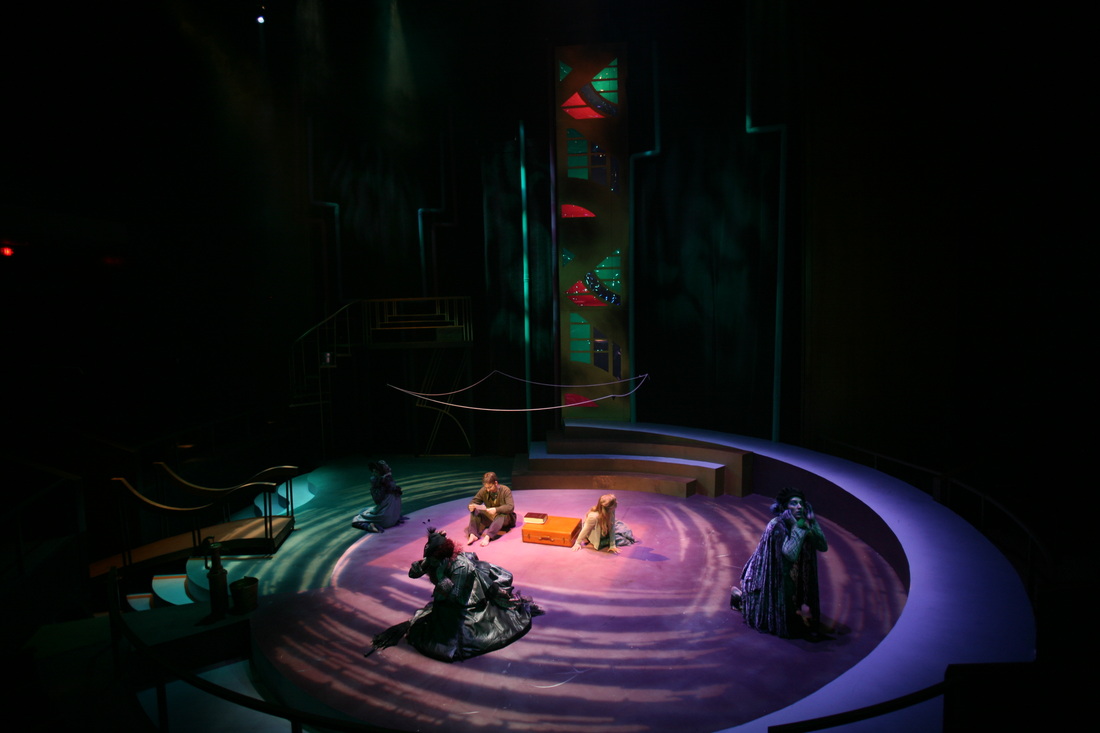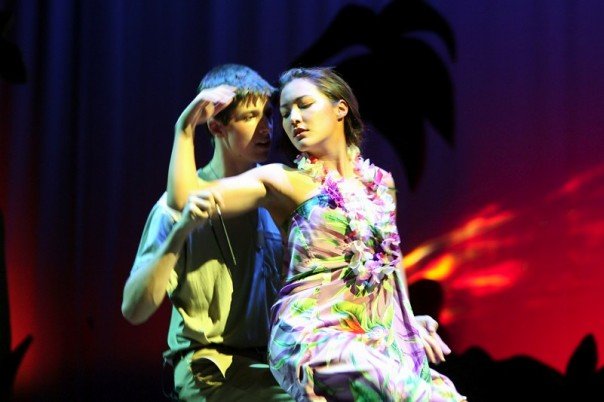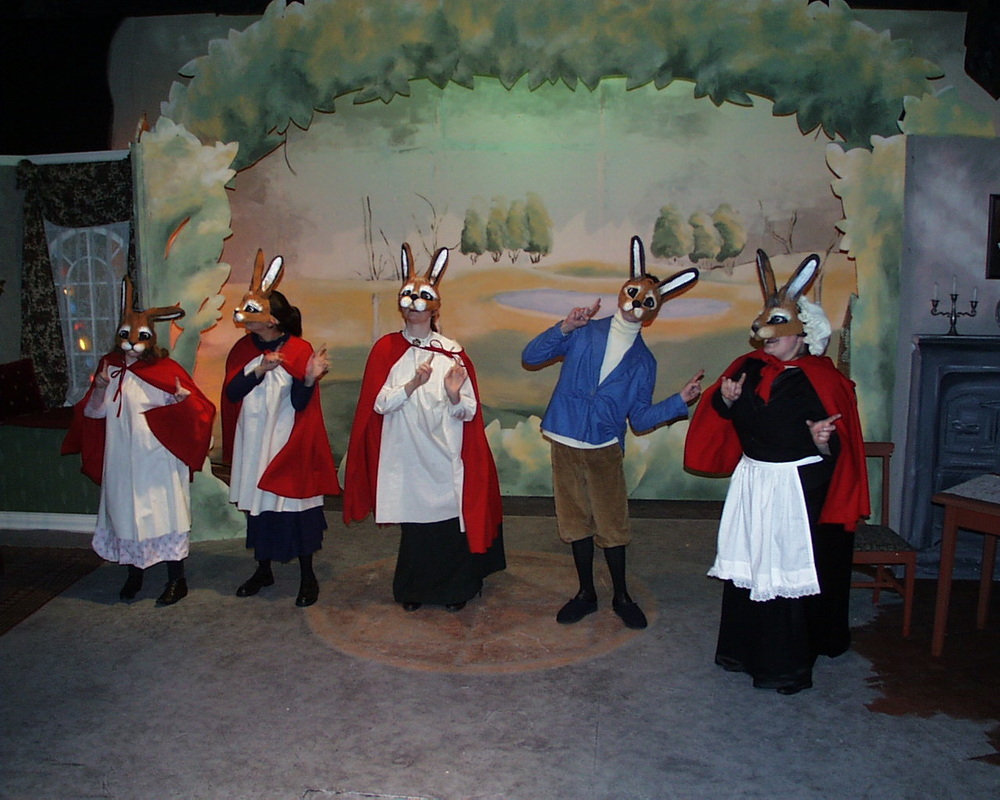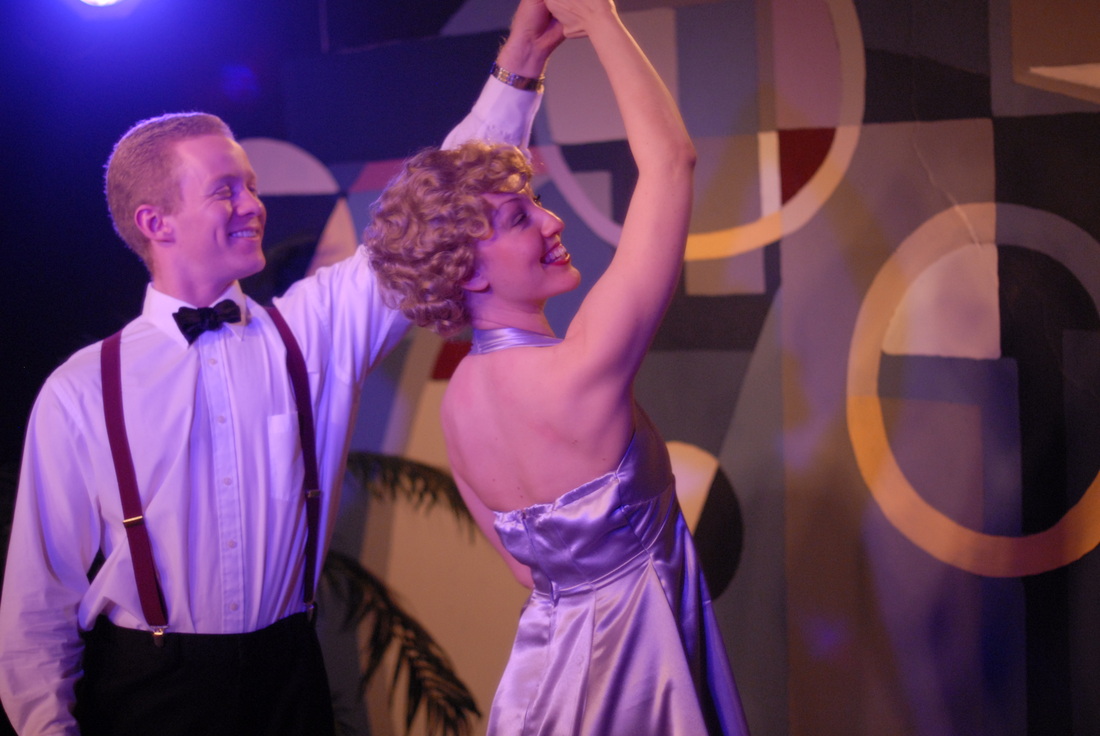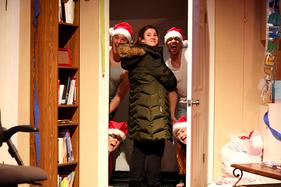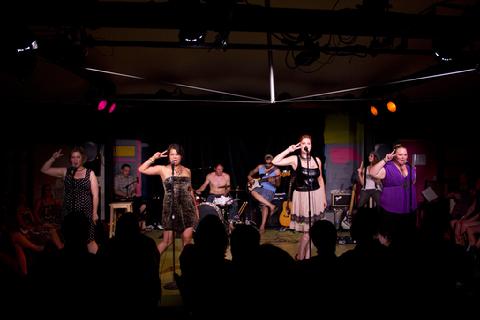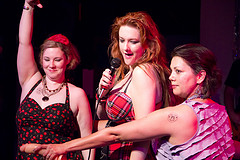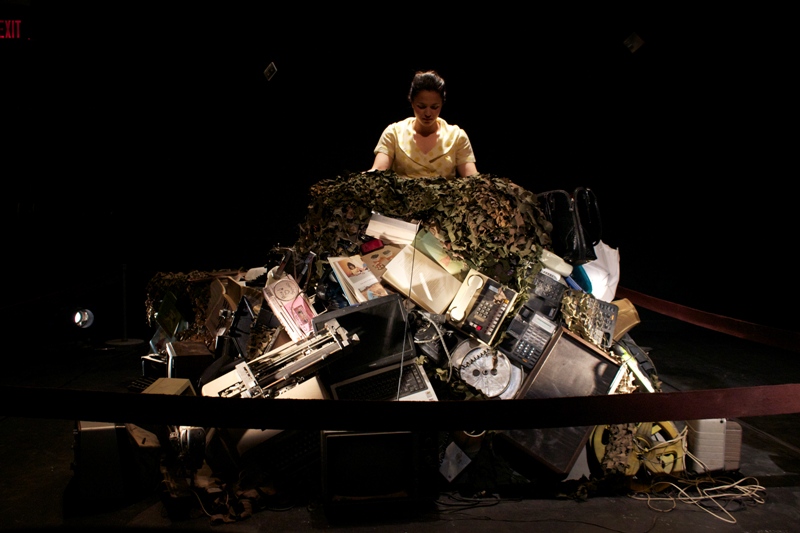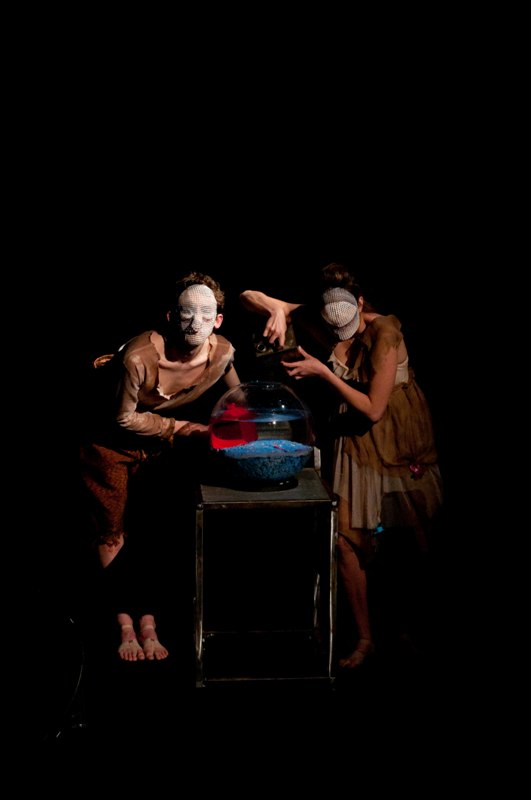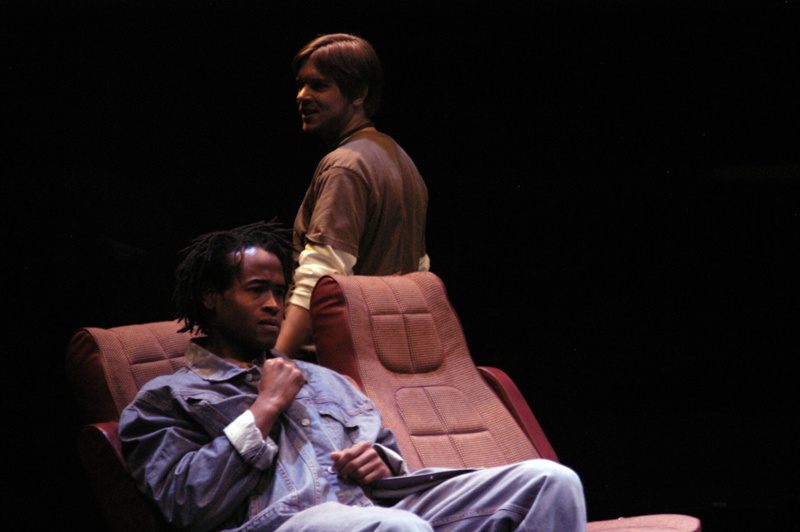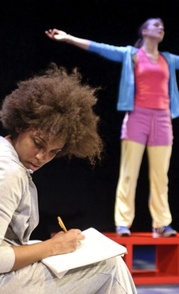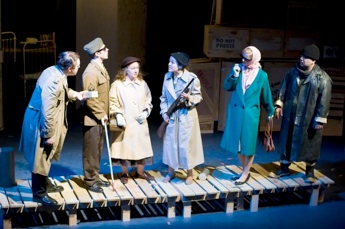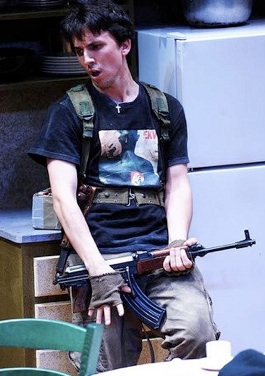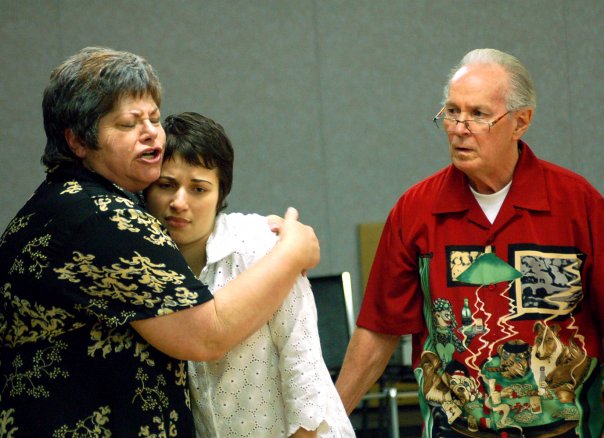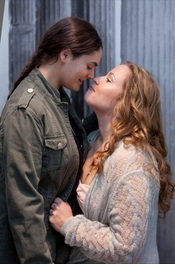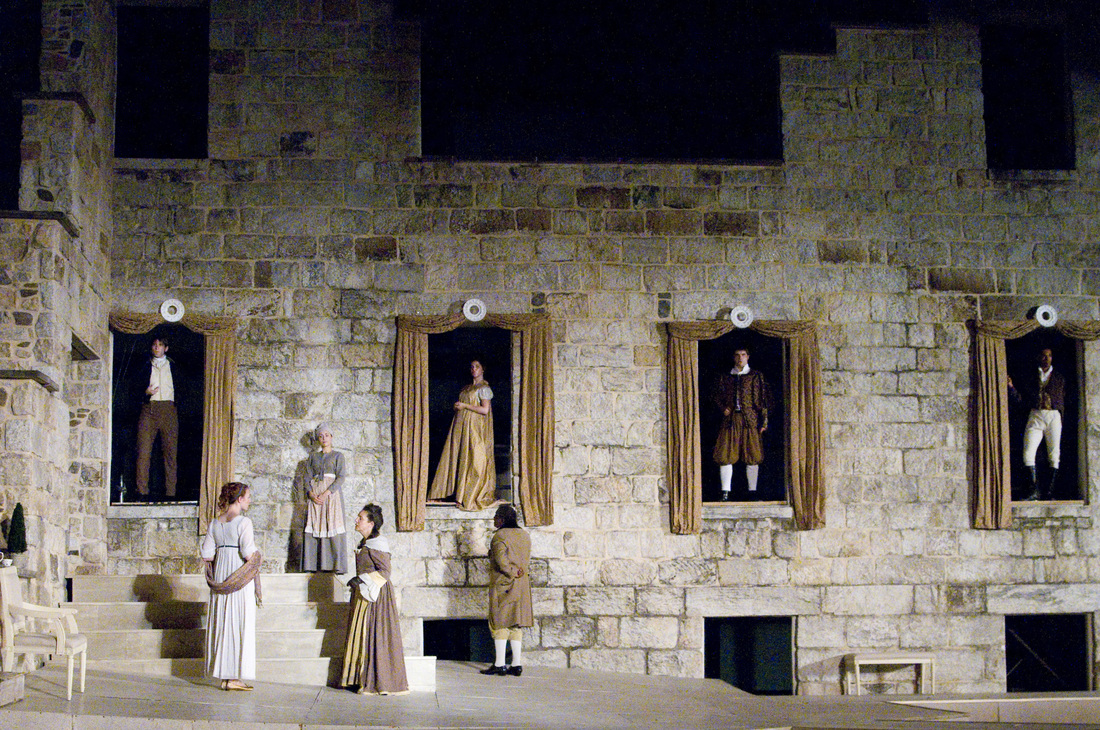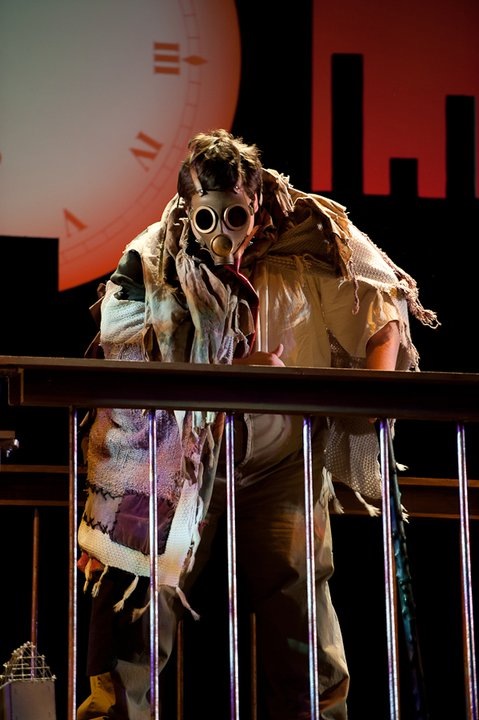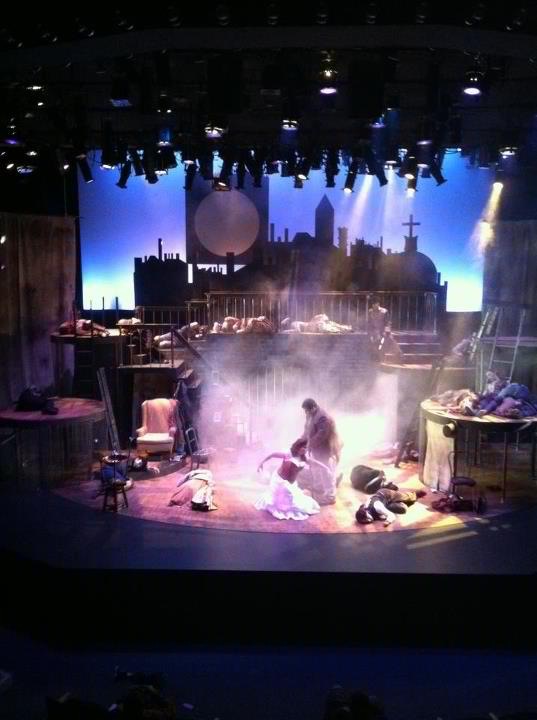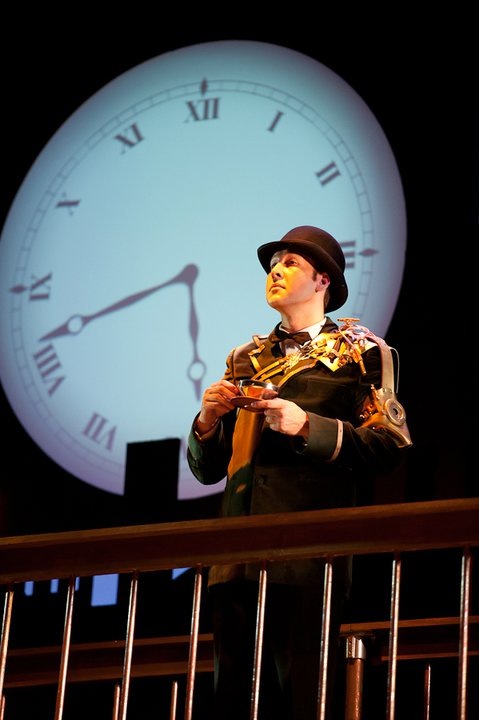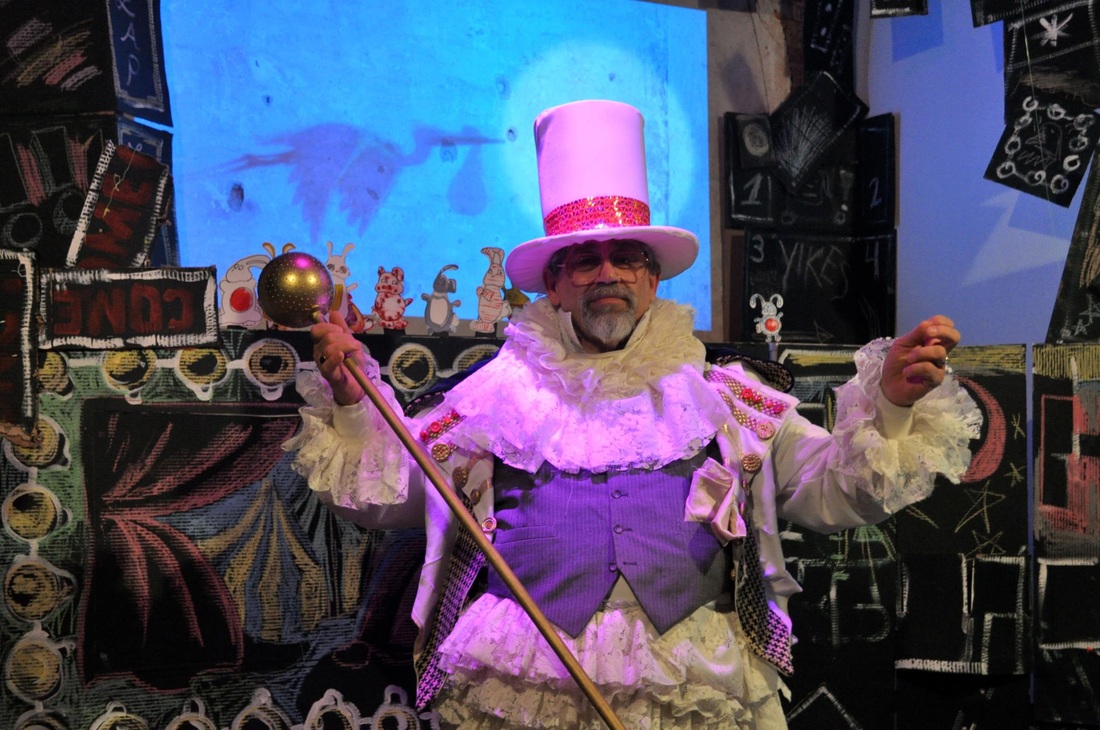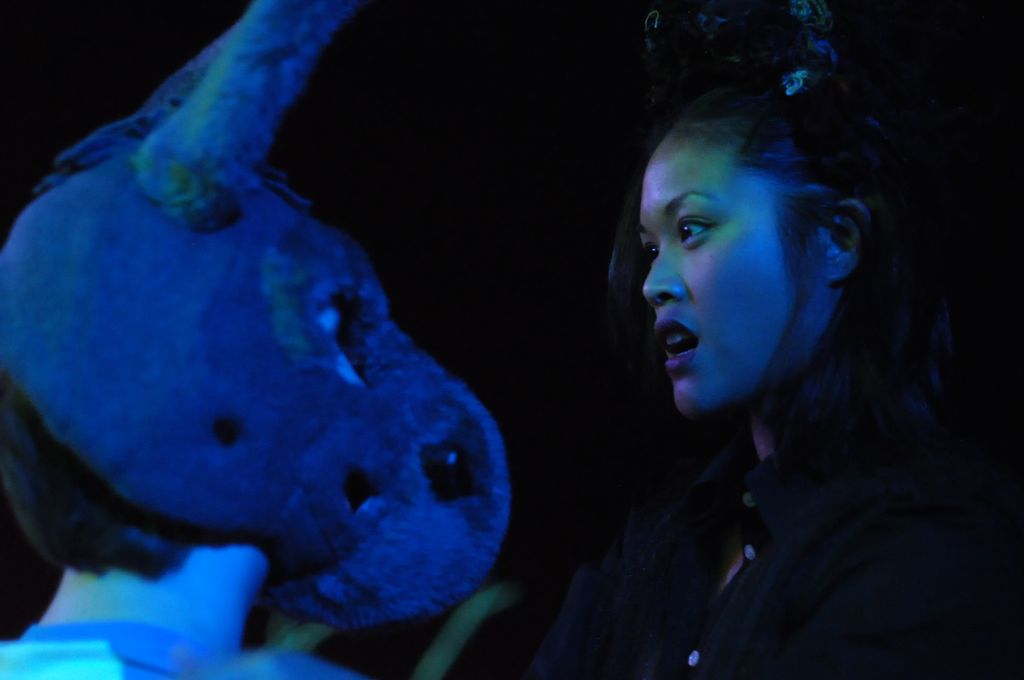|
Jacqueline Lawton: What was the first play that you ever directed? What did you learn from that experience that remains with you today?
Lee Mikeska Gardner: My first directing experience was play I wrote in the 6th grade. I had run through the 6th grade English curriculum (thanks to an ex-English teacher mother) and my teacher needed to keep me occupied, so for extra credit I wrote a play about Japanese culture, a subject we were studying, and directed it. It starred my best friend, Diane Webb. There was a lot of bowing. Much to the disappointment of my ex-English teacher mother, I gave up writing soon thereafter and began my theatre adventures. I was 12. I never looked back. I had a great Jr. high/high school program, and later college program that gave me the fundamental skills and honed qualities I use to this day, including tenacity bordering on mule-stubbornness. I worked very hard for my accomplishments - the years when I desperately wanted to act and had braces that gave me “peanut butter mouth” were a special kind of torture. But there was always something to do to keep me engaged. Throughout high school and college I assumed I‘d go into acting and stage managing - I never thought of directing. In both settings wise teachers saw something in me and casually suggested I direct this or that or take a class in directing. But I didn’t consider myself a director until I co-directed Fat Men in Skirts with Howard Shalwitz at Woolly Mammoth. Until then, I was an actor who filled in as a director when none could be found. My interest was in making the actors look good. I was a happy with black cubes and furniture borrowed from my house. I directed (and and acted) for many years at the original Source Festival and went on to form Vest Pocket Theatre Company, which survived a couple of years before I realized how little I really knew about running a theatre company. With Fat Men, I worked side by side with Howard, for whom I had assistant directed on a couple of shows, and began what I consider my M.F.A. in directing. I was on the 10 year program, about how long I was an Associate Artist at Woolly Mammoth. I took my fundamental passion for a good yarn, learned craft and began to articulate my aesthetic. After that show I just kept working as a director and haven’t really stopped. Directing comes easily to me: acting is much harder - all my degrees and formal training are in acting. But I could never do one without the other. JL: Why did you decide to get into theatre? Was there someone or a particular show that inspired you? LMG: I went into theatre to escape a home life filled with mental and physical illness. My parents couldn’t catch a break and as much as they loved their children, they were uncommunicative and dysfunctional and even at 12, I intuitively knew I had to find a way out of that daily tension. My story of 6th grade playmaking is true - it’s how I was introduced to theatre - but the events at home compelled me to take full advantage of the escapist aspects of theatre and for a long time fueled my work. My parents inspired me, in an anti-role model way. Because each of them were not allowed to pursue what they really dreamed of doing (astronomy, medicine) they were not about to tell their children they couldn‘t do something. But they weren‘t thrilled with the idea of theatre and they made me work for it. As I watched them succumb to illness in my early 20’s the equation, to me, equaled “don‘t do what you love, live unhappily and die early.” Because of my parents, and my rocky home life, I had something to say as a director at a very early age - I didn’t struggle to find my voice and exploring the fundamental human condition of sorrow will always be of primary interest to me. Theatre is in my bones. While I write about directing in this forum, I speak of theatre as a Theatre-maker. I have settled in to acting and directing, with some teaching thrown in, but I’ve worked at every aspect of theatre-making at some point. I’m not always good at it, whatever it may be, but I’m capable, and I possess an intuitive and relentless need to learn. I have tried several times to quit - to find an easier way to make a living and have a life - but I come back to it. Or it comes back to me. Making theatre is active. It satisfies my intellect, my hands, my need for challenges, my social needs, my need for expression, my undiagnosed A.D.D. and my desire to have an impact on people, in a way that no other profession does. JL: What kind of work do you do to pay the bills? How do you balance this work with your work as a director? LMG: Balancing the financial issues is easy. Balancing the quality of life choices is so individual. I’ve had all manner of jobs to supplement my theatre work when needed. For a long time I was an Executive Secretary to an attorney until I decided to make a go of living off my theatre income and turned over the job to a favorite stage manager. I’ve temped, I’ve worked retail, I’ve had two disastrous stints as a personal assistant, I went into theatre management, I went to grad school and lived off student loans… A condition of every job was that I was allowed to take the time I needed to do theatre. I sacrificed benefits and insurance, often, for time and a decent hourly wage. As I get older, I have a vague fear of never being able to quit working - but then, I don’t really want to. I knew from the time I was 12 I would have this kind of life and realized at about 18 what that meant financially. Facing my parents’ mortality drove me to a “live for the moment” philosophy rather than a “save for the future” philosophy. Facing my son’s future, I’ve started to balance those scales a bit. JL: In DC, we have the Capital Fringe Festival, the Intersections Festival, the Source Festival, the Kennedy Center's Page-to-Stage Festival, the Black Theater Festival, and the Hip Hop Theatre Festival. We also have the Mead Lab at Flashpoint Theater Lab Program. Have you participated in any of these? If so, can you speak about your experience? LMG: I’ve done a few things with these entities, but they’ve never been central to my work. Others can speak more intelligently on this topic. JL: How many plays have you directed in the DC area? How many of them were written by women? By playwrights of color? How conscious are you selecting plays by women or people of color when deciding your season? LMG: Including workshops, readings and academic theatre, I’ve directed over 70 productions. About half of them were plays written by women. Only one or two of them have been by playwrights of color, as a white woman director, I’m not seriously considered for plays written by POC. I don’t like being labeled as a “white woman director” so I don’t label the work of others. It doesn’t mean I’m not aware of the disparity of white men and everyone else - it means that when I’m offered a good play, I do it, regardless of by whom it’s written. JL: How do you feel the DC theatre community has addressed the issues of race and gender parity? How has this particular issue impacted you and your ability to work? LMG: The theatre community is highly aware of the lack of diversity in theater programming and has been for 20 years. The idea of racial parity first hit D.C. two decades ago when it became clear how absurd a city that had a majority black population had no black theatre or that other theatre’s weren’t giving black artists a place at the table. Theatres began mindfully to program plays by writers of color and start “color-blind” casting. I actually lost roles due to this policy and was not hired to direct “black” plays because I wasn’t. The idea of gender parity didn’t even occur to me until I was hired for a show because someone was looking for a “woman” director. I recently was talking to a director who had relocated from NYC and she was telling me about a job she didn’t get because she was no longer a NY director. She was saying (and I’m paraphrasing) it drove her crazy “because I’m a --” and I inserted “good director.” She said “… New York director. I still consider myself a NY director.” The fact is, we all have biases and we all have to work at getting our work done. Another fact is, white men, as a general rule, find it easier to do. The issue is - always - public support and funding. The several theatre companies that arose to address the lack of representation by woman, people of color, and the GLBT community didn’t survive, leaving it up to the theatres run primarily by white guys to take up the slack. Really!? Now keep in mind, it was white guys who gave me every break since high school along my career path. I got nothing against the white guys. There is no question that there is a need for mindful programming representing the community and world in which we live, regardless of who is making those decisions. But the audiences need to be there, the funders need to be there, the artists need to be up to the task, to make it stick. Making theatre with a diverse group of artists is not the problem. Getting people to the theatre is the issue because baseline reality - theatre is a business, not a social service. If we want more representation, we have to make a lot more noise and be prepared to self-produce and, ultimately, find the audiences who want to support us. JL: If you could be direct at any theatre in DC, which would it be and why? LMG: I like to work at theatres that do interesting work and whose Artistic Directors have good minds. Forum, Constellation, Rorschach, are a few theatres on my list that I haven’t tapped into yet. JL: DC audiences are ... LMG: Intelligent, passionate, adventurous, supportive and still too small. JL: DC actors and designers are ... LMG: Creative, committed, professional, smart, bold, willing, alive, eager, the best. JL: DC playwrights are ... LMG: Under-recognized, although I think that’s changing. I think with the advent of locavore theatre more new work is getting produced at different levels and that can only benefit everyone. A playwright can’t get better at what they do unless they get to do what they do and that means productions. D.C is good at importing talent - I’d like to see more export, too - which means I’d like to see more theatres take risks, which means I’d like to see more audiences supporting theatre, which means funders have to pay attention, which is another conversation altogether. JL: DC critics are ... LMG: Not in love with theatre any more. At the least the ones at the major print publications. I feel the love from the on-line media sources and I go to them first these days, but I also wince at a lot of amateurish writing. I am being quite blunt - but I have been known to write to a critic about a badly written or unfair review, so this should be no surprise to any of them. And let me get on a soap box now. I don’t like that one person (or a handful) has the opportunity to dictate the success of a production. It’s bad business. Any artist who thinks challenging a review is “sour grapes” and therefore won’t, is allowing other people to define the art form. I won’t ever challenge someone’s subjective reaction to the work, but I don’t take bad or lazy writing or a limited view-point quietly. I usually write privately to the critic because I’m challenging his or her skill or focus - but every now and then I’ll do it publicly because I want the give and take of other viewpoints. Ultimately, the role of the critic these days has been reduced to a piece of a marketing plan. Good reviews - Plan A. Bad or mixed reviews - Plan B. And what I want, as an artist, is public and private conversation. I don’t do my work in a bubble - I do it to challenge myself and challenge/entertain others and I never mind a little thoughtful pushback. It’s one of the ways I learn. I want the reviewers to work as hard as I do to get better at what I do to get better at what they do. JL: What advice do you have for an up and coming DC based director or a director who has just moved to D.C.? LMG: I became a director by accident during a time of growth and my direct experience is atypical. But I know what I was looking for when I was running theatre companies and hiring artists. Take the time to see theatre. Check out big and small companied. Identify the kind of work or style you are drawn to - not that you have to be boxed in by that, but with 80+ working theatres, you can’t hope to network with all of them at the same time. Send out your materials. Know how to talk about yourself and what you like to do. Expect slow going, but be tenacious. Work the Fringe, the Source, the Festivals, The Actors’ Center. Let people know what you are doing. A director with a background like Eleanor Holdridge’s will find a place quickly, but up and coming directors will have to be focused and patient and ready to make theatre. To all artists who are struggling to find their place in any city - know what else you love to do and do it. An unhappy theatre artist presents a tense, unhappy person that is hard to hire. Know that you probably won’t work steadily for awhile and find joy in other parts of your life that will feed the theatre work when it does come. And have faith in two things. 1. There is no expiration date on how long you can work if you choose. You can come and go as your life dictates and while there may be hard choices, you don’t have to sacrifice family or friends to find success. 2. Your life will feed your art. Someone who’s life is wrapped around theatre only becomes a dull artist. With no world view or outside interests you have very little to talk about on stage. JL: What's next for you as a director? Where can we keep up with your work? LMG: First, I’m playing Mrs. Fisher in a 1924 play called The Show Off by George Kelly at The American Century Theatre. Then I’m directing The 25th Annual Putnam County Spelling Bee with the Washington Savoyards in March, a new Allyson Currin play, Caesar and Dada in May at WSC Avant Bard and Blythe Spirit at 1st Stage. After that, it’s a mystery.
0 Comments
Jacqueline Lawton: Why did you decide to get into theatre? Was there someone or a particular show that inspired you?
Renana Fox: My grandmother and aunt are both theater professors and successful directors (by which I mean they have consistently gotten paid for their work). With two strong female role models and a cultural heritage of performance I had a lot of reasons to pursue a life in the theater. My mother was both an educator and a professional storyteller and growing up I watched her perform and found her ability to engage an audience somewhat magical. It certainly wasn’t a single moment where I realized that this was the life for me, it was more an accumulation of experiences that made me realize theater was meaningful and transformative. JL: What was the first play that you ever directed? What did you learn from that experience that remains with you today? RF: I actually just finished directing my first full production a few months ago for Artists Initiative. It was called BOOM! by Peter Sinn Nachtrieb and I’ve been in love with the script since I first read it four years ago. I would say most importantly I learned to be confident in my choices. I spent a long time directing readings and assisting people so it’s hard to trust that you’re finally experienced enough to make your own decisions, but it’s also really exciting. JL: What kind of work do you do to pay the bills? How do you balance this work with your work as a director? RF: All kinds of things! I temp at non-profits, I work as a substitute teacher for DCPS and a local daycare center. I work as a teaching artist for local theaters. I babysit. I try to find work that allows for a creative outlet, that makes me happy, and that offers flexibility for the theater job opportunities that come along. I can’t do bartending or retail mainly because I know I have to spend a lot of time waiting for the next theater job, and I need that time to be used for something I find just as fulfilling and meaningful as the art I create. JL: In DC, we have the Capital Fringe Festival, the Intersections Festival, the Source Festival, the Kennedy Center's Page-to-Stage Festival, the Black Theater Festival, and the Hip Hop Theatre Festival. We also have the Mead Lab at Flashpoint Theater Lab Program. Have you participated in any of these? If so, can you speak about your experience? RF: The only one of those festivals I’ve participated in is the Capital Fringe Festival. I worked as a performer and costume designer for several shows and it is a very interesting process. It gives a lot of new artists opportunities, which I think is wonderful. There’s no filter so some work is fantastic and some is terrible but everyone gets to give their art a try. The biggest problem I have found is that the audience draw is not big enough or varied enough to fill all the seats, which makes it hard to break even, much less get your art seen. JL: How many plays have you directed in the DC area? How many of them were written by women? By playwrights of color? How conscious are you selecting plays by women or people of color when deciding your season? RF: I’ve directed three staged readings and one full production since moving to DC two years ago and only one of those was written by a woman. I think it’s incredibly important to support women and people of all ethnic backgrounds in the theater, but equally important for me is to connect with the piece I am going to direct. Finding a new, young, playwright at the same stage in their career as I am, with a similar approach to theater is hard enough. If I can meet someone who is all that and a woman, I feel incredibly lucky, but at this point I’m just happy to work with someone whose work I enjoy and respect. JL: How do you feel the DC theatre community has addressed the issues of race and gender parity? How has this particular issue impacted you and your ability to work? RF: I’m not sure the theatre community has really addressed the issues. I think most theatres still produce shows that are primarily white-men-focused. Then there are theaters that produce shows focusing on African American themes or ‘women’s issues’ but there aren’t a ton of productions (and maybe not enough scripts) that reflect the gender and widely varied backgrounds of audience members. I don’t know that this particular issue has hindered my ability to work, so much as my youth and a tendency among most theaters here to be loyal to past artists and continually hire them back. JL: If you could be direct at any theatre in DC, which would it be and why? RF: My dream is to direct for Woolly Mammoth. I think they do wonderful work to support new artists with unconventional approaches to theater. They take risks and when they fail they fail big, but when they make something good, it is phenomenal. I want to work in an environment that supportive and encouraging of its artists. JL: DC audiences are ... RF: Out there, we just have to find them and let them know DC has great theater that they don’t know about yet. The ones who already know about us are dedicated and loyal, they’re just all friends with each other and have both limited time and limited funds. JL: DC actors and designers are ... RF: Incredibly hard working and dedicated to their art. JL: DC playwrights are .. RF: Provocative and eager to make a difference with their art. JL: DC critics are ... RF: Often too focused on their own opinions as opposed to objectively judging a production based off its artistic value. JL: What advice do you have for an up and coming DC based director or a director who has just moved to D.C.? RF: Make friends and see all the theater you can. JL: What's next for you as a director? Where can we keep up with your work? RF: I’m directing another short piece for an upcoming Inkwell festival in December. After that just keep your eyes peeled for my name on DC Theater Scene and Actors Center. Jacqueline Lawton: Why did you decide to get into theatre? Was there someone or a particular show that inspired you?
Amber Jackson: I guess you could say I found my way into theatre through film. I grew up watching the old MGM classic musicals and my appreciation for theatre evolved from there. JL: What was the first play that you ever directed? What did you learn from that experience that remains with you today? AJ: The first play I ever directed was a short 10-minute piece written by my theatre professor, who is also a playwright. We rehearsed that thing to death. So I started coming up with exercises for the actors to help keep it fresh: Do the whole scene with just movement and no words/Do the whole thing but say it in your own words/ Play one of the other characters in the scene. I still love to incorporate exercises like that in my rehearsal process when there is time. JL: What kind of work do you do to pay the bills? How do you balance this work with your work as a director? AJ: I feel like one lucky lady because my “day job” is actually writing and directing film for a company called WILL Interactive. I love it. I love the challenge of switching between theatre and film as two powerful storytelling mediums. While WILL focuses 90% of its time on film, the one exception is a live production on the topics of Suicide and Domestic Violence Prevention for the US Army at Fort Hood, TX. I have had the honor and privilege to direct this work for 3 years, and it is by far the most fulfilling work I do. JL: In DC, we have the Capital Fringe Festival, the Intersections Festival, the Source Festival, the Kennedy Center's Page-to-Stage Festival, the Black Theater Festival, and the Hip Hop Theatre Festival. We also have the Mead Lab at Flashpoint Theater Lab Program. Have you participated in any of these? If so, can you speak about your experience? AJ: Yes, and I love them all!!! My very first project in DC was directing a piece for Inkwell Theatre at the Page-to-Stage Festival. I think it’s a fantastic way to join the theatre community together to celebrate new work. I have had the privilege to work with the Source Theatre Festival twice: I directed a 10-minute play in 2011 and a full-length play this past summer. Jenny and the team there are so committed to bringing quality new work to the DC area and offer so many opportunities for directors looking to get their feet wet. (Their new mentorship program is an amazing idea). I haven’t directed any projects for the Mead Lab at Flashpoint (yet), but I was part of the creative ensemble that brought John Michael MacDonald’s The Nightmare Dreamer to life this past spring. I’ve been kickin’ around the idea of submitting a show to the Fringe Festival, but so far I’ve only participated as an actor…I was in one of the scenes for Faction of Fools’ Tales of Marriage and Mozzarella this past summer. JL: How many plays have you directed in the DC area? How many of them were written by women? By playwrights of color? How conscious are you selecting plays by women or people of color when deciding your season? AJ: If you count staged readings and assistant directing, I would say I’m around a couple dozen directing opportunities so far. I love working with female playwrights. I would guess that probably 2/3 of the plays I have directed since coming here were written by females. But in terms of picking my work—which is rare, since a lot of my projects have been chosen for me—I don’t think I actively pursue plays by a specific race or gender. I just pick the best play with the story that speaks to me the most. JL: How do you feel the DC theatre community has addressed the issues of race and gender parity? How has this particular issue impacted you and your ability to work? AJ: I don’t feel as though my gender has held me back. What does hold me back though is a lack of opportunities to direct full-length plays if you don’t want to produce them yourself. In my opinion, many of the smaller theatres in town were started by Artistic Directors who were looking for opportunities to direct. They end up directing a lot of their own shows, so there is little room for the outsiders to find their way in. And too many of the “big name” theatres in town hire their directors out of NYC, which is B.S. JL: If you could direct at any theatre in DC, which would it be and why? AJ: Woah, that’s tough. I guess Woolly Mammoth would be my first choice. I love their commitment to new plays. Sarah Ruhl is probably my favorite playwright, and I love that her work has been featured there. After directing Gregory Moss’s play, The Uses of Enchantment, this summer for Source, I’m very excited to see what may come from Woolly’s relationship with his work. Also, Mia Chung’s You for Me for You was a play I had the honor to direct for a short Inkwell evening two years ago, and I was so excited to see it at Woolly this year. I think the heartbeat of the work they do just closely matches the style of storytelling I am most attracted to. JL: DC audiences are ... AJ: Split in two. (in my opinion) I think it’s rare to see the Shakespeare/ Kennedy Center crowd mingle with the black box theatres. JL: DC actors and designers are ... AJ: Amazing! I haven’t worked with many different designers yet, but for the actors—between the films I cast for my day job, and the numerous readings I’ve done with Inkwell, I’ve probably worked with 150-200 actors in the area. They’re wonderful, hardworking artists. JL: DC playwrights are ... JL: DC critics are ... AJ: Not focused on the big picture. JL: What advice do you have for an up and coming DC based director or a director who has just moved to D.C.? AJ: Find a theatre home. Constellation was my first theatre home. Building that community and having a home base has been invaluable. JL: What's next for you as a director? Where can we keep up with your work? AJ: I’m all over the place! I’m bee-bopping between theatre and film a lot these days. My next theatre-directing project is with Burning Coal theatre in Raleigh, NC. I’ll be collaborating with my dear friend (and playwright and actor) Rebecca Bossen on her play, Blue Straggler, which I was originally introduced to through the Inkwell. You can find me on the stage this spring at First Stage Theatre in Never the Sinner, directed by Jeremy Skidmore. I’ve also just joined the core team of producers at Inkwell, so I’ll be focusing a lot on New Play development in the coming year. You can also look for updates on my website: www.amber-jackson.com Jacqueline Lawton: Why did you decide to get into theatre? Was there someone or a particular show that inspired you?
Lynn Sharp Spears: Why get into theater? I had a science teacher in 9th grade who heard me playing my guitar. He insisted I play for a school assembly. I was terrified-2000 students! My hands were sweating and I worried I’d foul it up...but it went just fine. I was hooked. JL: What was the first play that you ever directed? What did you learn from that experience that remains with you today? LSS: The first play I ever directed was South Pacific for a company my husband and I helped start; Damascus Theater Company in 1986(?). I learned that no matter how much you may like someone, you may not always have the same artistic vision. The production was successful. JL: What kind of work do you do to pay the bills? How do you balance this work with your work as a director? LSS: Paying the bills is always a challenge if you are an independent contractor. My friend Chuck Young, a wonderful DC Actor, recommended me to a producer for The Learning Channel back in 1991. I ended up doing Production Design and Casting for a number of the Great Books series and also the Understanding series. TV is a great supplement to the stage. It’s easier to balance when you’re directing because you have more control over the schedule. JL: In DC, we have the Capital Fringe Festival, the Intersections Festival, the Source Festival, the Kennedy Center's Page-to-Stage Festival, the Black Theater Festival, and the Hip Hop Theatre Festival. We also have the Mead Lab at Flashpoint Theater Lab Program. Have you participated in any of these? If so, can you speak about your experience? LSS: I love our Fringe Festivals! I directed a musical that I commissioned Joan Cushing to write while I was at Adventure Theater, Brave Irene, which we performed for Page-To-Stage. I directed Rosencrantz and Guildenstern are Dead with Kari Ginsburg for Fringe 2012. We also co directed Body Electric, a musical which I wrote for the 2012 Hope Operas that Chris Griffin produces. I’ve also performed or designed for Source’s Festival, Page-To-Stage, Fringe and the Washington Women In The Arts Festival. JL: How many plays have you directed in the DC area? How many of them were written by women? By playwrights of color? How conscious are you selecting plays by women or people of color when deciding your season? LSS: The year I was Artistic Director for Adventure Theater, back then you were only allowed to hold the position for a year, I commissioned five new plays for our season. Four of the playwrights were women. I have directed dozens of plays in the DC area, 6 of which were World Premieres. I gave the present Artistic Director, Michael Bobbitt, his first job at Adventure Theater. JL: How do you feel the DC theatre community has addressed the issues of race and gender parity? How has this particular issue impacted you and your ability to work? LSS: The DC Theatre Community is filled with amazing, creative, crazy people. I love most of them. We are slowly getting better with race and gender issues in both stage and film. I have been trying to burn a path through the male dominated TV industry for decades and we now have wonderful female producers and designers. I’d like to see more women DPs. JL: If you could be direct at any theatre in DC, which would it be and why? LSS: Studio Theatre. I love working there. Their creative and production teams are filled with wonderful people who are great fun to create with. I would love to direct there. JL: DC audiences are ... LSS: Challenging JL: DC actors and designers are ... LSS: Great People JL: DC playwrights are .. LSS: AWESOME! JL: DC critics are ... LSS: Sometimes misguided by their personal agendas. JL: What advice do you have for an up and coming DC based director or a director who has just moved to D.C.? LSS: Jump IN! We have an amazing array of vibrant theater companies in this town. See theater, go to talk backs, join Actor’s Center. JL: What's next for you as a director? Where can we keep up with your work? LSS: My next directing gig will be for Summer Theater Experience. I will be writing an adaptation of one of the Shakespeare comedies and Deborah Wicks LaPuma is going to write some music for it. VERY exciting! I don’t choose the plays until after we have our auditions in March at Artisphere. Jacqueline Lawton: What was the first play that you ever directed? What did you learn from that experience that remains with you today?
Toni Rae Salmi: My first play was ‘Dentity Crisis by Christopher Durang my senior year in college. I learned to trust my instincts when it came to a myriad of things, but comedy and casting come to mind first. I also learned that in all actuality, the director does NOT have all of the power. There’s always someone with a bit more who might control some strings that you were not aware of. At that point, it was the faculty, but in later years, it’s your artistic director or producer that might have a final say in how a production goes. JL: Why did you decide to get into theatre? Was there someone or a particular show that inspired you? TRS: My story is not unique: I saw a play and thought to myself, “I can do that,” and proceeded to put myself out there. It came fairly naturally to me, at least the acting part, but it wasn’t until I was cast as Lady Macbeth in college did I realize that to be fully satisfied with your work onstage you REALLY had to do your homework. Looking back I wish that my school offered a “how to market yourself as a director” course, or took the time to focus on that. I went to a smaller school, and was on the academic track in grad school so I never learned how to do that; then again, I'm not sure if schools offer it. JL: What kind of work do you do to pay the bills? How do you balance this work with your work as a director? TRS: I oversee educational programs and research for a trade association in Northern Virginia. I have responsibilities and travel quite a bit, so it gets more challenging when my day job is busy. Getting a directing gig at the beginning of the year through early spring is ideal, because that’s the slow period for my day job, but it never seems to work out that way, and I still manage to pull it off! But as the years go by, I know there IS a balance you have to strike, so sometimes you have to say no. I say no more on the directing side unfortunately because I DO have to pay the bills. JL: In DC, we have the Capital Fringe Festival, the Intersections Festival, the Source Festival, the Kennedy Center's Page-to-Stage Festival, the Black Theater Festival, and the Hip Hop Theatre Festival. We also have the Mead Lab at Flashpoint Theater Lab Program. Have you participated in any of these? If so, can you speak about your experience? TRS: I have directed twice for Pinky Swear: the award-winning Cabaret XXX: Les Femmes Fatales and Cabaret XXX: Love the One You’re With. I also performed in both shows. First let me say I do not recommend this. I keep saying I won’t do it and then I get roped back in, but I am determined to not be swayed in the future. Your focus is too split and neither position gets the full attention it deserves. Anyway, since the shows were both so successful, my Fringe experience was great! Sure it was hot in the tent and the conditions were never ideal and we had to conform to strict set and light parameters, but once you are aware of those parameters, it’s such a fun atmosphere and such great audiences that all the challenges are easily forgotten, at least from a performance/production perspective. JL: How many plays have you directed in the DC area? How many of them were written by women? By playwrights of color? How conscious are you selecting plays by women or people of color when deciding your season? TRS: Both Fringe Cabarets could be categorized as devised pieces, with the focus entirely on the female experience. Carol’s Christmas was written by local female playwright Marni Penning. All of Pinky Swear’s plays have been written by women and I believe that won’t be changing too much in the future. JL: How do you feel the DC theatre community has addressed the issues of race and gender parity? How has this particular issue impacted you and your ability to work? TRS: As someone who is half-Filipino, I do identify as a person of color. I can only address what I know and that is that the Asian-American theatre folk are struggling to get some group back together; I hope to be a part of that when it happens. In regards to work, as an actor, I think it most definitely has impacted my ability to work, but as a director, I haven’t been doing it that much here so it really hasn’t affected me. JL: If you could be direct at any theatre in DC, which would it be and why? TRS: Taffety Punk! Because I k now and love them and know that I would get AMAZING performances from them. Plus, I like their style, their bravery and their “bring it to the people” attitude. A few years ago I might have named a bigger theatre, but that’s not where my head is these days. JL: DC audiences are ... TRS: A motley bunch and will surprise you. You cannot assume the stoney-faced grandma in the front row is not having a good time J JL: DC actors and designers are ... TRS: Hungry for more work and willing to do whatever you ask of them. JL: DC playwrights are ... TRS: Not recognized enough. JL: DC critics are ... TRS: Critics. And EVERYONE is a critic, so if you hate or can’t take criticism, you’re going to be a very unhappy person in this business. JL: What advice do you have for an up and coming DC based director or a director who has just moved to D.C.? TRS: There is something for everyone here. SEE EVERYTHING, then decide your path. Accept that you’re going to have to get a day job. I can count on one hand those theatre folk I know who don’t have a day job. And welcome to a friendly nurturing community! JL: What's next for you as a director? Where can we keep up with your work? TRS: Well, since I'm in a show with Hub Theatre this summer, I won’t be involved with Fringe, but more than likely I will be directing something for Pinky Swear next season. I haven’t really put myself out there for other companies but I would welcome the opportunity. Jacqueline Lawton: Why did you decide to get into theatre? Was there someone or a particular show that inspired you?
Jess Jung: When I was six years old my mother took me and a group of my friends to see Snow White and the Seven Dwarves at a local theatre. I had never been to the theatre before. I remember flashes – walking into the foyer, sitting in the audience, a green light on stage, feeling scared, feeling as though my body was being lifted from my seat, a blackout, being forced to say hi to the actor who played Snow White, embarrassment, astonishment at the fake wrinkles drawn on the Wicked Witch’s face. It was all so magical. A couple years later I decided that my neighborhood friends and I were going to put on our own Snow White. I spent hours upon hours, days, and then weeks getting everything prepared. I sat obsessively in front of the TV transcribing Disney’s Snow White into my wide-ruled notebook. I held “auditions” and announced the cast. I hand stitched Snow White’s cleaning skirt from old dishrags and scraps. I fabricated the wishing well from a stool (turned upside-down), butcher paper and paint. I even learned how to play “Some Day My Prince Will Come” on my mother’s piano. Unfortunately my friends soon lost interest with my obsession and we never made it past the first scene, but that did not dissuade me. I was unabashedly dedicated to the magic I experienced during my first encounter with the theatre. JL: What was the first play that you ever directed? What did you learn from that experience that remains with you today? JJ: The first project I directed was for a student work’s festival at my undergraduate institution. I had just started developing interest in directing and was obsessed with the plays of Jane Martin. I decided to direct a scene from Anton in Show Business (as every student was only given a 10-15 minute time slot). I wasn’t entirely sure how to direct at that time, but I was excited to take the reins. It was the first time I experienced the actor-director relationship from that end – and I learned about the importance of collaboration. JL: What kind of work do you do to pay the bills? How do you balance this work with your work as a director? JJ: I work as a teaching artist for multiple theatres to pay the bills. This can be tedious as I spend a great deal of my time in transit. However, I do enjoy getting to work in my field and (hopefully) inspiring another generation of theatre artists. A few of the companies I teach for have also employed me as a director (YPT, Adventure Theatre MTC, and Imagination Stage). This helps balance work and artistry. JL: In DC, we have the Capital Fringe Festival, the Intersections Festival, the Source Festival, the Kennedy Center's Page-to-Stage Festival, the Black Theater Festival, and the Hip Hop Theatre Festival. We also have the Mead Lab at Flashpoint Theater Lab Program. Have you participated in any of these? If so, can you speak about your experience? JJ: I currently serve as Associate Producer of the Source Festival. This is a new title and I’m extremely excited to have joined the team. I have the great pleasure of reading plays, recruiting staff, and managing casting. I also am working with Jenny McConnell Frederick to launch the Source Festival’s first design internships. This is sometimes a difficult post to coordinate with my teaching and directing schedule. However, I wouldn’t have it any other way as I love to be a part of a theatre’s vision. JL: How many plays have you directed in the DC area? How many of them were written by women? By playwrights of color? How conscious are you selecting plays by women or people of color when deciding your season? JJ: I’m still new to the DC area. I’ve directed for Inkwell, Adventure Theatre, Imagination Stage, Kleckography at Rorschach, and YPT. I have not been able to pick the play for any of these projects. I am extremely interested in plays written by women. It is important for me to tell female stories and I hope this will be apparent as my work develops in DC. JL: How do you feel the DC theatre community has addressed the issues of race and gender parity? How has this particular issue impacted you and your ability to work? JJ: I don’t think I’ve been in DC long enough (1 year) to answer this question – sorry. JL: If you could be direct at any theatre in DC, which would it be and why? JJ: Woolly. They are hip, diverse, and always pushing towards innovation. JL: DC audiences are ... JJ: In love with Shakespeare and musicals! JL: DC actors and designers are ... JJ: Lovely, open-minded collaborators. JL: DC playwrights are .. JJ: Witty. Smart. Sassy. JL: DC critics are ... JJ: Oh…just like critics in every city. JL: What advice do you have for an up and coming DC based director or a director who has just moved to D.C.? JJ: I feel I am still this. However, I would say – don’t be afraid to reach out to people you admire. The DC theatre community is surprisingly open and willing to embrace new artists. See lots of theatre and send lots of emails to the artists you want to collaborate with. Then be patient – which is about where I am in this newbee process. JL: What's next for you as a director? Where can we keep up with your work? JJ: I’m directing Grandfather Frost and the Snow Maiden by Michael Bobbitt for Adventure Theatre MTC in collaboration with the Hillwood Museum. After that, please check out my website jessjungdirecting.com Jacqueline Lawton: What was the first play that you ever directed? What did you learn from that experience that remains with you today?
Jessica Lefkow: The first play I ever directed was, ‘Crimes of the Heart’, in New Delhi. We had arranged for Shakti Shailini, the only shelter for battered women in the north of India, to receive a huge chunk of the box office profits- enough to buy a van for their street theater troupe. The troupe was comprised of the women themselves, who had lived through beatings, burnings, and- for many- the loss of their children and family identities. They would set up in town squares and begin to play out their own, true stories, soliciting feedback from the crowd that would inevitably gather, in an attempt to start a conversation about domestic violence. It was for many of them the first time they had appeared in public, much less to speak- and then to speak of events that were supposed to be hidden away from view! When the Shakti Shailini troupe attended our dress rehearsal- women who in spite of profound loss on so many levels were open and cheerful and so curious about our work- we brought out the remains of the prop birthday sheet cake to share with them after the performance. The women broke with all sincerity into a fractured, gentle but warm ‘Happy Birthday’ for the actor playing Meg. When they finished... There was nothing to say but, ‘thank you’. JL: Why did you decide to get into theatre? Was there someone or a particular show that inspired you? Jessica Lefkow: I first got seriously into theater as a lazy teenager looking for a good excuse to hang out after school for hours, (a bunch of us students ran an independent theater company out of the basement of the school building) and to not do my homework. Very quickly, I started to work harder at theater than at any other thing! JL: What kind of work do you do to pay the bills? How do you balance this work with your work as a director? Jessica Lefkow: Until this year, I was the primary parent for my three sons, while their dad brought home the salary that pays for the roof and the insurance. His was also the job which we followed around the planet for 17 years. That said, I’ve taught, done voice-over and coaching jobs between directing and performing gigs, and am always working on something. JL: In DC, we have the Capital Fringe Festival, the Intersections Festival, the Source Festival, the Kennedy Center's Page-to-Stage Festival, the Black Theater Festival, and the Hip Hop Theatre Festival. We also have the Mead Lab at Flashpoint Theater Lab Program. Have you participated in any of these? If so, can you speak about your experience? Jessica Lefkow: I’ve directed for nearly every Capital Fringe Festival until this year, (and performed and produced there, too.) I’ve also worked in the Page-to-Stage and Source Festivals. Each of them is a glorious mess in its own way. I love these festivals for the abundant opportunities they provide for running into the unexpected, from new production companies to actors fresh to DC stages, to directors, designers and playwrights testing out fresh ideas and collaborations. JL: How many plays have you directed in the DC area? How many of them were written by women? By playwrights of color? How conscious are you selecting plays by women or people of color when deciding your season? Jessica Lefkow: I've directed 18 full productions in the DC area. eleven of those have been by women, none by people of color- though I have directed work by playwrights of color when Iwas living elsewhere.I think I'm probably more conscious of gender than color, though I am aware of the cultural or ethnic differences between playwrights that may not be about color. I'm always pleased to direct plays in voices less represented in the mainstream, but rarely consider gender or ethnicity above other things unless asked to by the producing company. JL: How do you feel the DC theatre community has addressed the issues of race and gender parity? How has this particular issue impacted you and your ability to work? Jessica Lefkow: Our community speaks with more comfort about gender than race, as does our society. Unlike many industries, however, ours should be a destination for conversations about these and other issues with which we grapple. Even we theatre-makers do a better job addressing these issues in our work than we do when we do as ‘civilians’- we need the theatre as much as our audiences do! I embrace all the things which I can bring to the table- my identity is comprised of my gender and ethnicity as much as by my interests, knowledge and experiences. I have experienced being excluded from the creative table on the basis of both my race & my gender when living in other cultures. Here, I believe that my gender registers much more often than not, and occasionally my race as well, as a defining directorial qualifier on some level. As long as this is true, my ability to work will of course be impacted. Perhaps on some level this is okay, as our community strives to tell a variety of stories through many lenses. This is not to say I don’t mind the present reality, where the impact is arguably much more negative than positive; I do, and very much so! Women and people of color are still too often seen in the American conversation as offering an ‘other’- as opposed to ‘another’- point of view. I’ve definitely failed throughout my life to fulfill expectations of how a woman ‘should’ react, or should behave & speak, and I do think that this has impacted my career. JL: If you could direct at any theatre in DC, which would it be and why? Jessica Lefkow: Helen Pafumi of the Hub has both passion and an idiosyncratic ear for the poetry of so much new work. I know few producers whose seasons are so motivated by the sheer love of the material. I gain new perspective about every play that I’ve discussed with her, and every play I’ve seen at her theatre- usually something that I have or would have overlooked. That’s the best kind of daunting. JL: DC audiences are ... Jessica Lefkow: Partisan. JL: DC actors and designers are ... Jessica Lefkow: Invariably hard-working. JL: DC playwrights are ... Jessica Lefkow: Growing in number and distinctive voice. JL: DC critics are ... Jessica Lefkow: Becoming more skilled as a group at commentary, thank heavens! JL: What advice do you have for an up-and-coming DC based playwright or a playwright who has just moved to D.C.? Jessica Lefkow: Find the playwrights! This is an incredibly collegial town, and I am inspired by the conversation and support I see amongst the playwrights I know here. JL: What's next for you as a director? Where can we keep up with your work? Jessica Lefkow: I’ll be directing the reading of a triptych of plays by Allyson Currin, Renee Calarco and Jason Odell Williams for Pinky Swear Productions on October 21. Look for me at www.dogandponydc.com or keep up with current productions on the news page of www.jessicalefkow.com Jacqueline Lawton: Why did you decide to get into theatre? Was there someone or a particular show that inspired you?
Ty Hallmark: I’m a lifer. I’m the kid that did the church musicals and school plays and realized I could make an audience laugh. That revelation happened when I was about 7 years old and I’ve identified myself as a storyteller, in some way, ever since. JL: What was the first play that you ever directed? What did you learn from that experience that remains with you today? TH: Although I did not know what to call it then, I did a devised piece for my senior project at Rhodes College. I gathered a playwright, a group of actors and some musicians and together we built a performance that explored my difficulty grappling with the Holocaust and the whole “why does God let bad things happen to good people” question. It stirred conversation on my campus and won me several end of the year awards. For a long time, I considered it my best work. I’m happy to have moved on but I still approach any show I direct as a collaborator - one piece of a large puzzle that creates a beautiful picture when complete. JL: What kind of work do you do to pay the bills? How do you balance this work with your work as a director? TH: I always joke that, when you included my theatre work, I have three jobs. There’s the day job that pays the bulk of the bills – I’m the Records Coordinator for an education and healthcare law firm in Washington DC. Then there are my soul satisfying/egg money jobs – from April thru October, I work as a guide for Washington Walks. I lead tours through Lafayette Square Park, Dupont Circle and, starting next year, Woodley Park and the National Cathedral. My full-time employers have always been great about flexibility, allowing me time for auditions and tech week. Several have even come to see my shows. It is a very difficult balance and, especially as I get older, I cannot maintain the constant schedule. I make sure to take breaks every year, for several weeks, sometimes months at a time and I’m more discerning about the offers I accept. I used to feel like I had to do everything that was asked of me but I’m definitely better about saying no and feeling good about that decision. In whatever capacity, as actor, director or educator, I know I’m a life-long artist so I’m no longer in any sort of rush to pack my resume. Giving myself and my family breathing room increases the quality of work I eventually sign up to do. JL: In DC, we have the Capital Fringe Festival, the Intersections Festival, the Source Festival, the Kennedy Center's Page-to-Stage Festival, the Black Theater Festival, and the Hip Hop Theatre Festival. We also have the Mead Lab at Flashpoint Theater Lab Program. Have you participated in any of these? If so, can you speak about your experience? TH: The Fringe Festival has been the backbone of my professional experience in the DC area. Before Fringe, I was biding my time in community theatre and not plugged into the scene in DC at all. Fringe changed all of that. I participated in every festival for the first five years either as an actor, director, producer or stage manager and sometimes all of those at once. There have been years when I was a crazy person and did two shows at Fringe. I met the majority of my future collaborators through these projects and nicely, some of my closest friends too. JL: How many plays have you directed in the DC area? How many of them were written by women? By playwrights of color? How conscious are you selecting plays by women or people of color when deciding your season? TH: 4.5 with another one on the way next summer. The .5 is counting my experience as an Assistant Director of Pride & Prejudice this past summer with Chesapeake Shakespeare Company (CSC). Our director, Isabelle Anderson, is generously collaborative and I was definitely not a “sit back and watch” Assistant Director in any kind of way. To date, I’ve directed one show written by a woman – an original script by the same playwright who helped with the senior project I spoke of earlier. Coming into directing as an actor, I think I gravitate toward plays that have great roles for women regardless of the playwright’s gender. I’m looking forward to working with a diverse population of artists in the future though. That’s one thing I truly love about living and working in DC. JL: How do you feel the DC theatre community has addressed the issues of race and gender parity? How has this particular issue impacted you and your ability to work? TH: It’s definitely an ongoing conversation. I see it often on Twitter and Facebook and I know the Washington Post wrote about it recently. I sense more and more that artists in DC are making opportunities happen for women and minorities. Theatre J, Forum Theatre and PinkySwear Productions come to mind. I haven’t yet felt this impacting my work directly though, as a woman, I feel it instinctively every day. I’m betting I question myself more and perhaps don’t as aggressively chase opportunities as my male counterparts. JL: If you could be direct at any theatre in DC, which would it be and why? TH: As a newbie director, this is my favorite question! Hopefully some of the powers that be are listening … I’d love to assist at Constellation or Forum Theatre. Both are inclined toward ensemble work though stylistically they are very different. I love anything Allison Stockman directs because it feels like watching her imagination explode on stage. I love the images she creates and I suspect she thinks about directing in a way similar to me. Forum chooses scripts wisely and with diversity in mind. I sense directors have a lot of freedom in staging and crafting the story. That really appeals to me. I’m also hoping I’ll have a chance to direct at CSC. I’m very drawn to their use of environment in staging and I have a few stories in mind that would fit well there. JL: DC audiences are ... TH: Enthusiastic, engaged, educated, open-minded JL: DC actors and designers are ... TH: Collaborative, supportive, wildly talented JL: DC playwrights are … TH: Ingenious, to be celebrated and showcased JL: DC critics are ... TH: Part of the conversation JL: What advice do you have for an up and coming DC based director or a director who has just moved to D.C.? TH: See theatre. Assist. Self-produce. Go to an open rehearsal. Direct a reading. Sign up to audit a cattle call audition. Be part of the social media conversation. Ask a director you admire to meet up for a drink and a chat. We’re a very welcoming, integrated community and we love new ideas and passions. JL: What's next for you as a director? Where can we keep up with your work? TH: Well, first I make a return to acting. I’ll play Sylvia in CSC’s Two Gentlemen of Verona directed by Patrick Kilpatrick. I’ve been cast in this role for literally two years so I’m excited to get it off the ground. After that I’m directing a series of Chekhov’s short scenes for Pallas Theatre Collective. It’ll go up at the Fringe Festival in July and then have a short run at DCAC in August. I’m also involved in a long term directing project with LiveArt. Kevin Finkelstein is writing the script, titled Causality, and we’re just beginning conversation with actors. I have a website that I’m actually pretty good about maintaining (tyhallmark.com) and you can find me on Facebook and Twitter. Jacqueline Lawton: Why did you decide to get into theatre? Was there someone or a particular show that inspired you?
Heather McDonald: The first play I directed was David Mamet's "American Buffalo" in college. I was quiet, bookish, plump and in the hurly burly of louder more aggressive directors choosing actors for projects, I was left with a young man with cerebral palsy, a six foot four linebacker from the football team and one of two African American students in the drama program. No one expected us to pull off a wild, funny, violent, visceral production where we smashed the set apart at every performance. It was exhilarating. What I learned is that it is great fun to direct voices that are very different from mine own as a writer. And that you never know what performance somebody might have inside of them. JL: What was the first play that you ever directed? What did you learn from that experience that remains with you today? HM: Two shows that inspired me - Deborah Warner's production of "King Lear" by KICK Theatre Company at The Edinburgh Festival. Simple, ferocious, passionate, wild. And FEN by Caryl Churchill directed by Les Waters at The Public Theatre. The stage was a field of dirt and scenes in an office or a living room were plopped right down there in the dirt. I loved that! JL: What kind of work do you do to pay the bills? How do you balance this work with your work as a director? HM: The work I do to pay the bills ... hmm, I was going to say playwriting but that pays about 3 cents an hour. I teach at George Mason University. I do other kinds of writing from time to time, librettos, rewrite work, film, television, I get asked to do workshops, now and then I've won fat grants, I hope my mother nominating me for the MacArthur "genius" award will eventually pay off! JL: In DC, we have the Capital Fringe Festival, the Intersections Festival, the Source Festival, the Kennedy Center's Page-to-Stage Festival, the Black Theater Festival, and the Hip Hop Theatre Festival. We also have the Mead Lab at Flashpoint Theater Lab Program. Have you participated in any of these? If so, can you speak about your experience? HM: I've worked at the Source Festival and have mentored projects from GMU students at Fringe and done several page to stage projects via TFA and also taught for years at the Kennedy Center Playwrights Bootcamp thing sponsored by Gregg Henry. JL: How many plays have you directed in the DC area? How many of them were written by women? By playwrights of color? How conscious are you selecting plays by women or people of color when deciding your season? HM: I directed at Round House, Signature, a lot at TFA (Theater of the First Amendment) that just closed after 20 years (sigh), workshop at Woolly Mammoth, and just did devised piece at The Lansburgh Theatre. I've directed lots of readings and workshops and college and university productions. Mostly new work, contemporary and my own. Quite a few by women. "Women of color ..." I was asked to direct Jennifer Nelson's last play but was unavailable and that made me sad because I adore her and I loved her play. Many times, I've gone after particular plays or projects that didn't work out. I don't consciously choose projects by women. I'm drawn to a voice that is different than my own as a playwright. I love the opportunity to work on a big canvas, thus the college and university productions. I like pieces that have some bold theatrical or visual element. JL: How do you feel the DC theatre community has addressed the issues of race and gender parity? How has this particular issue impacted you and your ability to work? HM: Plays written and directed by women are few. There was recently an article about how many women are directing in London. That was encouraging. But it really wasn't very long ago that Garry Hynes and Julie Taymor won Tonys for directing and they were the first women to do so in their respective categories. Kathryn Bigelow winning the Academy Award for "The Hurt Locker." Just a couple years ago. I mean, I think Sofia Coppola was the first woman director to even be nominated. I think a lot of this comes from deeply outmoded ideas about what leadership looks like. JL: If you could be direct at any theatre in DC, which would it be and why? HM: For me, it's more the play or the project, but I would like to direct at a theatre that would employ me. JL: DC audiences are ... HM: smart, savvy and a bit conservative in their tastes. JL: DC actors and designers are ... HM: the best, the absolute best. JL: DC playwrights are .. HM: a supportive, strong community in the making. JL: DC critics are ... HM: meh ... no comment. JL: What advice do you have for an up and coming DC based director or a director who has just moved to D.C.? HM: My advice would be to get to know playwrights and the acting pool here. And do anything Gregg Henry asks you to do. JL: What's next for you as a director? Where can we keep up with your work? HM: I'm more of a remembering-myself writer mode these days. I've been focused for many years on other peoples' work and have turned inward to my own worlds. My directing energies go into my students. I do a big, BIG, Ten Minute Play Festival every year. This year will mark my 7th as Artistic Director. It involved over 100 people last year. I'm hoping to get into a program next summer that will allow me to do collaborative work/devised/built work with a group of artists like I did with STAY. I'm in talks about a couple projects for next year when my youngest daughter leaves for college. One, a workshop, the other a full production. I'm tossing lots of things into the air and trust one of that will be caught. Jacqueline Lawton: What was the first play that you ever directed? What did you learn from that experience that remains with you today?
Elissa Goetschius: The Skriker by Caryl Churchill. The biggest lesson from that show was the importance of allowing my vision to shift as I worked with designers and actors. Adam Kielman (composer) and Johanna Kirk (choreographer) came in with incredibly smart reactions to the script that were entirely different from what I was expecting. I learned to trust myself to take time to understand how their visions differed from and fit together with mine. My role is to guide, not dictate. It’s okay to not have all the answers from the start. If you do, you’re probably not going to create a terribly interesting production. JL: Why did you decide to get into theatre? Was there someone or a particular show that inspired you? EG: I’ve always loved theatre - I grew up going to Toronto to see Les Miz, Phantom, Into the Woods, etc. with my mother and aunt. But it was going to Stratford, Ontario and seeing Stephen Ouimette’s Richard III was the real tipping point. It was a thrilling performance at the center of a fabulous production - directed by the Artistic Director at the time, Richard Monette. It began my obsession with Shakespeare and solidified for me that theatre was and is my field. JL: What kind of work do you do to pay the bills? How do you balance this work with your work as a director? EG: My first three and a half years in DC were spent working at Woolly Mammoth. I started as Howard’s assistant, then transitioned to the literary department when I went on staff. When I moved to literary, I had to set aside directing goals as literary required my full attention. But I learned a tremendous amount working with directors like Rebecca Taichman, Anne Kauffman, Daniel Aukin, John Vreeke, and Pam MacKinnon and playwrights Kirsten Greenidge, Sarah Ruhl, Jason Grote, Melissa James Gibson, David Adjmi, Peter Nachtrieb, Sherry Shephard-Massat, Sheila Callaghan, Noah Haidle, and Bridget Carpenter. As I realized I was happiest in the rehearsal hall and that I was more a director than a dramaturg (at least in the way our industry current divides responsibilities, I’m not picking that argument in this interview) I realized I needed to leave my job at Woolly to pursue my real passion. So I spent the next three and a half years working at Open City in Woodley Park as a server and barista. It’s a great restaurant run by the same folks who run Tryst, The Diner, and the newly-opened Coupe. I would open the restaurant at 6am, worked until noon or 2pm, then work on theatre projects in the evenings. It was manageable until tech weeks and openings. Then I would get tired to the point of losing my words. After a year of trying to balance this work with regular directing gigs (all of which happened to be in Baltimore), I’ve decided to take a step back, recharge, and take a new approach to a directing career. Meaning, I’m currently applying to grad programs. We’ll see how that goes in this next chapter. JL: In DC, we have the Capital Fringe Festival, the Intersections Festival, the Source Festival, the Kennedy Center's Page-to-Stage Festival, the Black Theater Festival, and the Hip Hop Theatre Festival. We also have the Mead Lab at Flashpoint Theater Lab Program. Have you participated in any of these? If so, can you speak about your experience? EG: I’ve directed two shows for Page-to-Stage. This past year, I worked with Taffety Punk on a reading of Liz Maestri’s new play Somersaulting, an adaptation of the graphic novel by Sammy Harkham. In 2009 I directed a reading of A Brief Narrative of an Extraordinary Rabbits by C Denby Swanson which I later directed at the EMP Collective in Baltimore. While it’s a great way to expose audiences to new plays and new playwrights, my biggest takeaway is just how much you miss out on when you only experience a reading of a play compared to a full production. I should be grateful for the opportunity - and I am - but it makes me realize the value of a full production. JL: How many plays have you directed in the DC area? How many of them were written by women? By playwrights of color? How conscious are you selecting plays by women or people of color when deciding your season? EG: From the group of artists involved in the projects I worked on in roughly the last year, there were three women and four playwrights of color. And six white men. And one female playwrights of color who dropped out of a project during the process. I’ve also spent the last two years developing a strong working relationship with DC playwright Liz Maestri, but we haven’t produced a show together yet. So the demographic breakdown isn’t too shabby. When I’m looking for projects that I am personally interested in directed, I don’t look at the demographic information of the playwright first. But when it comes to pitching projects or planning a season (having helped plan seasons at Woolly and Forum and having recommended plays to many other organizations over the years) I definitely try to share plays by women and playwrights of color whenever possible. (Ask me! I have lots of plays and writers to pitch!) The questions behind season planning are something I’ve been thinking about a lot lately with the rash of seasons popping up across the country that feature entirely white-male playwrights and directors. It’s depressing. I’ve been working on a blog post for some time now, creating a fictional season for a mid-sized theatre company and extrapolating season planning guidelines for these issues. Planning my imaginary season was the easy part - writing the blog post is taking a while. Ultimately it comes down to the priorities of an Artistic Director. How much do you value telling diverse stories and inviting diverse audiences into your theatre? Are you willing to take a “risk” by producing something that’s not a “name brand”? I tend to think it’s a larger risk to continue to program the same shows, or kinds of shows, and to further alienate potential audience members. I mean, look at how well Joe Dowling’s Christopher Hampton festival turned out. Link to the Star Tribune article: http://m.startribune.com/entertainment/?id=179578081 JL: How do you feel the DC theatre community has addressed the issues of race and gender parity? How has this particular issue impacted you and your ability to work? EG: Not terribly well if you look at the statistics on the current season helpfully compiled by Gwydion (http://www.suilebhan.com/2012/11/08/final-numbers-playwright-demographics-2012-13-dc-theater-season/). We can do better. It’s embarrassing that we aren’t. We should be embarrassed. JL: If you could be direct at any theatre in DC, which would it be and why? EG: I wanna play in the Cradle at Arena. It’s a gorgeous space, but I haven’t seen anything there since the #newplay festival when they presented work from the Rude Mechanicals and the Foundry (Provenance of Beauty was amazing). I’d want to do something like The Curious Walk of the Salamander by Kirsten Greenidge (commissioned by Woolly years ago, but never produced) or That Pretty Pretty; Or the Rape Play by Sheila Callaghan. JL: DC audiences are … EG: Intelligent and open-minded. JL: DC actors and designers are … EG: Awesome. Though I would extend that to the others artists in the area as well - pulling in visual artists on theatre projects and musicians is incredibly rewarding and we have a bunch of those in DC. JL: DC playwrights are … EG: Deservedly becoming more well-known. Young DC directors should track them down and get to know them - you might not be the right collaborator for all of them, but they’re a diverse bunch and you might find your One. JL: DC critics are … EG: Incredibly supportive in the best way possible. They don’t coddle artists and truly want them to succeed. Shout out to Peter Marks for being so engaged on twitter. JL: What advice do you have for an up and coming DC based director or a director who has just moved to D.C.? EG: Stay focused on the work you want to do. Connect with artists - playwrights, designers, etc. Build your network. Don’t be stingy about introducing people, offering suggestions for resources, etc. But be careful about spending too much time on work that benefits others more than you. If you join a company be completely blunt about what you want to get out of your time spent working with them. Are you going to help organize auditions? Help with fundraising? Help with props? Great. Do you want to direct a reading? A show? Get a solid answer on whether this will happen or not. Be blunt and upfront. It makes things easier in the long run. It’s a lesson that takes a long time to learn and implement. I’ve spoken with far more experienced people who are still struggling with this issue. Also, don’t take every opportunity that you’re offered. If I don’t like a script, I don’t do my best work. You want to be proud of all of your projects. And don’t forget about Baltimore. It’s not that far away and yes, it might be a pain to get up there on a regular basis, but their scene is amazing and totally different from DC. Get to know the EMP Collective - they straddle both cities and can help with introductions. Tell Carly Bales I sent you. JL: What's next for you as a director? Where can we keep up with your work? EG: I’m currently taking a #hermityear: applying for grad school programs and reading all of the books I’ve accumulated on my shelves over the past several years. I’m also working on a new project with La Maestri and tossing ideas around with a few other favorite collaborators in the DC and Baltimore area. You can find me on twitter at @egoetschius. And I’m in the process of creating a website, but in the meantime you can follow my tumblr at egoetschius.tumblr.com. |
My BlogI'm a playwright, dramaturg, and teaching artist. It is here where you'll find my queries and musings on life, theater and the world. My posts advocate for diversity, inclusion, and equity in the American Theatre and updates on my own work. Please enjoy!
Categories
All
Archives
June 2020
Reading List
|
